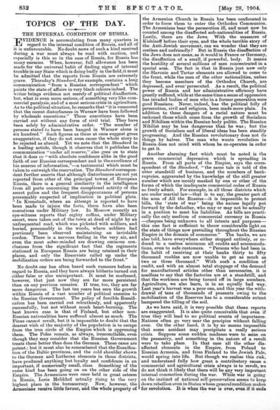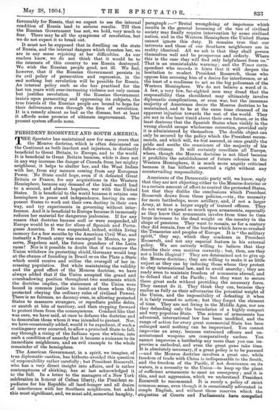-9 VIDENCE is accumulating from many quarters in regard to the
internal condition of Russia, and all of ' it is unfavourable. No doubt news of such a kind received during a war must always be read with caution, and especially is this so in the case of Russia, for Russia has many enemies. When, however, full allowance has been made for the universal habit of finding signs of internal trouble in any State which is doing badly in the field, it must be admitted that the reports from Russia are extremely grave. Thursday's Standard, for example, contains a long communication "from a Russian correspondent" which paints the state of affairs in very black colours indeed. The writer brings evidence not merely of political disaffection, but, what is even more serious, of something very like com- mercial paralysis, and of a most serious crisis in agriculture. As to the political situation, he remarks that "it is rumoured that the recent disturbances in Warsaw have been followed by wholesale executions." These executions have been carried out without any form of civil trial. They have been solely by administrative order. "The number of persons stated to have been hanged in Warsaw alone is six hundred." Such figures as these at once suggest gross exaggeration, if they do not even cause the whole story to be rejected as absurd. Yet we note that the Standard in a leading article, though it observes that it publishes the communication "under all reserve," also goes on to state that it does so "with absolute confidence alike in the good faith of our Russian correspondent and in the excellence of his sources of information,"—a testimonial which must be taken to outweigh the reservation. The Standard correspon- dent further asserts that although disturbances are not yet reported from other of the principal towns of European Russia, there is a. general similarity in the intelligence from all parts concerning the exceptional activity of the secret police and the frequent disappearances of persons presumably suspected of implication in political plots. "In Sronstadt, where an attempt is reported to have been made to .injure the forts, there have also been executions under Military law. In Moscow recently an eye-witness reports that eighty coffins, under Military escort, were taken out of the town at dead of night by an unfrequented road, which was picketed with soldiers, and buried, presumably in the woods, where soldiers had previously been observed maintaining an inviolable cordon. There is a nervous feeling in the very air, and even the most sober-minded are drawing ominous con- clusions from the significant fact that b the regiments stationed in European Russia are being retained in their places, and only the Reservists called up under the mobilisation orders are being forwarded to the front."
No doubt one has often heard such rumours before in regard to Russia, and they have always hitherto turned out either false or else unimportant. It must be confessed, however, that just now they are far more persistent than on any previous occasion. If true, too, they are far more dangerous. The last ten years has seen the growth within Russia of a vast number of political enemies to the Russian Government. The policy of forcible Russifi- cation has been carried out relentlessly, and apparently successfully, but not without much heart-burning. The best known case is that of Finland, but other non- Russian nationalities have suffered almost as much. The Finns cannot revolt, but it is impossible to doubt that the dearest wish of the majority of the population is to escape from the iron circle of the Empire which is oppressing them. The Poles remain, as always, irreconcilable, even though they may consider that the Russian Government treats them better than does the German. These cases are patent ; but it must also be remembered that the Russifica- tion of the Baltic provinces, and the cold shoulder shown to the German and Lutheran elements in those districts, have produced anything but loyalty and confidence in an important, if numerically small, class. Something of the same kind has been going on on the other side of the Empire. The Armenians were once held in great esteem in Russia, Loris Melikhof actually rising to the very highest place in the bureaucracy. Now, however, the Armenians receive little favour, and the whole property of the Armenian Church in Russia has been confiscated in order to force them to enter the Orthodox Communion. The Armenians bear the persecution ill, and must now be counted among the disaffected sub-nationalities of Russia. Lastly, there are the Jews. With the massacre of Kishineff before their eyes, and the whole terrible story of the Anti-Jewish movement, can we wonder that they are restless and unfriendly? But in Russia the disaffection of the Jews does not mean, as it would in France or Germany, the disaffection of a small, if powerful, body. It means the hostility of several millions of men concentrated in a special area. The fact is that in Russia just now only the Slavonic and Tartar elements are allowed to come to the front, while the men of the other nationalities, unless they become members of the Orthodox Church, are depressed, and even' persecuted. As a result, the political power of Russia and her administrative efficiency have greatly suffered, while at the same time a sense of oppression has invaded bodies of men who in a former generation were good Russians. Never, indeed, has the political folly of persecution, civil and religious, been made more plain. In addition to these dangers of a, racial nature must be reckoned those which come from the growth of Socialism and Nihilism within the Russian body politic. The Russian Nihilist may be less dangerous than he was ; but the growth of Socialism and of liberal ideas has been steadily progressing. And the Russian revolutionary does not do things by halves. The man who wants revolution in Russia does not mind with whom he co-operates in order to get it.
Another alarming fact which must be noted is the grave commercial depression which is spreading in Russia. From all parts of the Empire, says the corre- spondent of the Standard, "the same tale is told of the utter standstill of business, and the numbers of bank- ruptcies, aggravated by the knowledge of the still greater number which are merely masked by one or other of the forms of which the inadequate commercial codes of Russia so freely admit. For example, in all those districts which are under martial law—that is to say, the greater part of the area of All the Russias—it is impossible to protest bills, the 'state of war' being the excuse legally put forward by the defaulter, who may or may not be actually in a position to meet his liabilities. As bills are practi- cally the only medium of commercial currency in Russia —cheques being unknown to all intents and purposes— this one fact is sufficient to throw considerable light on the state of things now prevailing throughout the Russian Empire in the domain of commerce." The banks, we are also told, have everywhere either stopped entirely, or re- duced to a useless minimum all credits and accommoda- tions, even to safe customers. "Persons who had been in the habit of receiving at their banks thirty to fifty thousand roubles are now unable to get as much as two or three thousand." With such a condition of credit, and with an almost total stoppage of the demand for manufactured articles other than necessaries, it is needless to say that the factories are at a standstill, and that the workmen are being turned off in large numbers. Agriculture, we also learn, is in an equally bad way. Last year's harvest was a poor one, and this year the with- drawal of tens of thousands of peasants owing to the mobilisation of the Reserves has to a considerable extent hampered the tilling of the soil.
As we have said, it is very possible that these reports are exaggerated. It is also quite conceivable that even if true they will lead to no political events of importance. Nations often go very near the precipice without falling over. On the other hand, it is by no means impossible that some accident may precipitate a really serious crisis. Suppose some sudden madness were to seize on the peasantry, and something in the nature of a revolt were to take place. In that case •all the other dis- affected elements in the Empire, from Poland to Russian Armenia, and from Finland to the Jewish Pale, would spring into life. But though we realise this risk, and understand fully how great a contributory cause a commercial and agricultural crisis always is to revolt, we do not think it likely that there will be any very important internal commotion during the war. While war is going on the instinct of national self-preservation seems to keep down rebellion even in States whose general condition makes for revolution. It is when the war is over, even if it ends favourably for Russia, that we expect to see the internal condition of Russia lead to serious results. Till then the Russian Government has not, we hold, very much to fear. There may be all the symptoms of revolution, bat we do not expect it to break out.
It must not be supposed that in dwelling on the state of Russia, and the internal dangers which threaten her, we are in any sense rejoicing at her difficulties. As our readers know, we do not think that it would be to the interests of this country to see Russia destroyed. We wish the Russian people good, not ill. We feel, however, that if the Russian Government persists in its evil policy of persecution and repression, in the end nothing but revolution will be possible for Russia. An internal policy such as she has practised for the last ten years with ever-increasing violence not only causes but justifies revolution. If the Russian Government insists upon persecuting and oppressing its subjects, the true friends of the Russian people are bound to hope for their deliverance even through the fires of revolution. -It is a remedy almost as bad as the disease, but at least it affords some promise of ultimate improvement. The present system affords none.







































 Previous page
Previous page